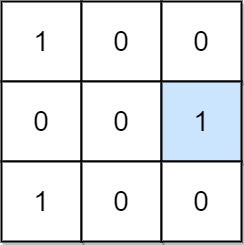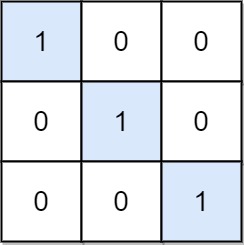Problem
Given an m x n binary matrix mat, return **the number of special positions in **mat.
A position (i, j) is called special if mat[i][j] == 1 and all other elements in row i and column j are 0 (rows and columns are 0-indexed).
Example 1:

Input: mat = [[1,0,0],[0,0,1],[1,0,0]]
Output: 1
Explanation: (1, 2) is a special position because mat[1][2] == 1 and all other elements in row 1 and column 2 are 0.
Example 2:

Input: mat = [[1,0,0],[0,1,0],[0,0,1]]
Output: 3
Explanation: (0, 0), (1, 1) and (2, 2) are special positions.
Constraints:
m == mat.lengthn == mat[i].length1 <= m, n <= 100mat[i][j]is either0or1.
Solution (Java)
class Solution {
public int numSpecial(int[][] mat) {
int count = 0;
for (int i = 0; i < mat.length; i++) {
for (int j = 0; j < mat[0].length; j++) {
if (mat[i][j] == 1 && isSpecial(mat, i, j)) {
count++;
}
}
}
return count;
}
private boolean isSpecial(int[][] mat, int row, int col) {
for (int i = 0; i < mat.length; i++) {
if (i != row && mat[i][col] == 1) {
return false;
}
}
for (int j = 0; j < mat[0].length; j++) {
if (j != col && mat[row][j] == 1) {
return false;
}
}
return true;
}
}
Explain:
nope.
Complexity:
- Time complexity : O(n).
- Space complexity : O(n).